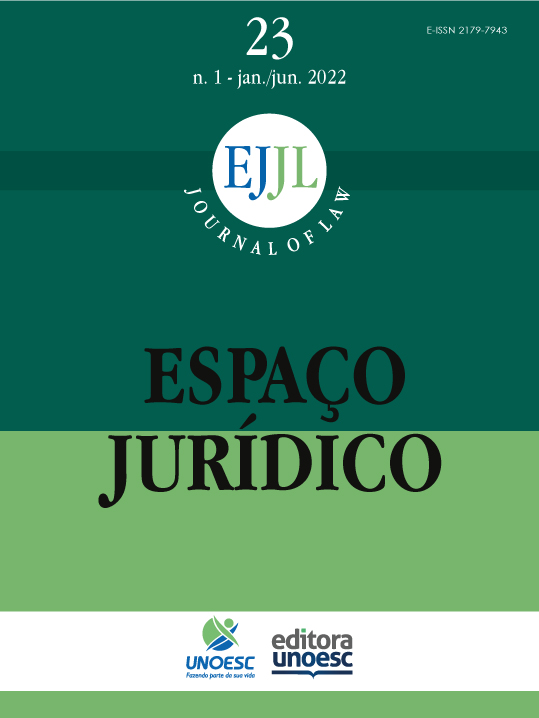Usos do tempo no século XXI: chaves de leitura para uma reforma (urgente) do tempo de trabalho
DOI:
https://doi.org/10.18593/ejjl.30424Keywords:
Working time, Reform, Reproductive work, Balancing of personal, Balancing of personal, family and work life, Work in the digital eraAbstract
In the 21st century, the uses of time continue to be subordinated to the needs of capitalist production, under the standards, moreover, of a completely exhausted production model: the Fordist model. This confinement assumed by the policies of law, that of labor flexibility understood in a unidirectional way (only in favor of satisfying the interests of business subjects), must be reversed by evaluating the socioeconomic impact that the neoliberal model of labor relations has caused, in terms of working time. With this, the opening of spaces for political-legal debate that critically and pro-labour promote the (urgent) reform of working time, in which transcendental issues are addressed, such as, at least, the relationship between productive work and (re)productive; the need to reverse the economic-business hegemony in the regulation of time, including work time; a more balanced use of internal flexibility of working time that satisfies the interests and needs of working people; a new reformulation of the regulations that promote a reconciliation of private and work life where the personal element is revitalized and in which the relationship between work and family expands to accommodate models of the latter other than the archetypal ones; the adaptation of the regulations to the demands of work in the digital age without incurring in the determinism of the economic narration or of technological self-absorption.
Downloads
References
Alarcón Caracuel, M. R. (1986). La ajenidad en el mercado: Un criterio definitorio del contrato de trabajo. Revista Española de Derecho del Trabajo, 28.
Alarcón Caracuel, M. R. (1988). La ordenación del tiempo de trabajo. Madrid: Tecnos.
Alarcón Caracuel, M. R., & Mirón Hernández, M. M. (Coords.). (2000). El trabajo ante el cambio de siglo: un tratamiento multidisciplinar. Madrid: Marcial Pons.
Bakunin, M. (1867). El sistema capitalista. Socialismo, Federalismo y Antiteologismo.
Barcelona. (2021, Diciembre 26). El nuevo servicio de canguro municipal de Barcelona atiende a unos 400 niños desde octubre. https://www.elperiodico.com/es/barcelona/20211226/servicio-municipal-barcelona-canguro-publico-concilia-13029712.
Baylos Grau, A. (2000). La huida del derecho del trabajo: tendencias y límites de la deslaboralización. In M. R. Alaracón Caracuel, & M. M. Mirón Hernández. (Coords.), El trabajo ante el cambio de siglo: un tratamiento multidisciplinar. Madrid: Marcial Pons.
Cabeza Pereiro, J. (2020). El ámbito del trabajo subordinado y del trabajo autónomo en el Derecho de la Unión Europea. Bomarzo.
Democratizing Work. (2019, Noviembre).¿Cómo desmercantilizar el trabajo de cuidados? https://www.youtube.com/watch?v=I6Pr-LpPjto.
INE. (2021). Encuesta continua de hogares. Año 2020. https://www.ine.es/dyngs/INEbase/es/operacion.htm?c=Estadistica_C&cid=1254736176952&menu=ultiDatos&idp=1254735572981.
Ley 10/2021, de 9 de julio, de trabajo a distancia. BOE n. 164, de 10 de julio de 2021, pp. 82540-82583. https://www.boe.es/eli/es/l/2021/07/09/10.
Navarrete, C. M. (2021, Junio 10). El conflicto de conciliación trabajo-familia y monoparentalidad. https://www.net21.org/conciliacion-trabajo-familia-monoparentalidad/.
Net 21. (2022, Marzo 2). Cuarta entrevista sobre la Reforma Laboral. https://www.net21.org/cuarta-entrevista-sobre-la-reforma-laboral/.
OIT. (2011). El tiempo de trabajo en el siglo XXI: Informe para el debate de la Reunión tripartita de expertos sobre la ordenación del tiempo de trabajo, 17-21 de octubre de 2011, Oficina Internacional del Trabajo, Ginebra, OIT. https://www.ilo.org/wcmsp5/groups/public/---ed_protect/---protrav/---travail/documents/publication/wcms_162148.pdf.
Ritzer, G., Dean, P., & Jurgenson, N. (2012). Ther Coming of Age of the Prosumer. Sage Journal, 56(4), 379-398. https://journals.sagepub.com/doi/full/10.1177/0002764211429368. DOI: https://doi.org/10.1177/0002764211429368
Sangueon, L. (2008). El tiempo de trabajo en el mundo. Tendencias en horas de trabajo, leyes y políticas en una perspectiva global compartida. Madrid: Ministerio de Asuntos Sociales.
Todolí Signés, A. (2017). El trabajo en la era de la economía colaborativa. Valencia: Tirant lo Blanch. https://adriantodoli.com/2017/10/26/nuevos-indicios-de-laboralidad-la-ajenidad-en-la-marca/.
Trillo Párraga, F. (2010). La construcción social y normativa del tiempo de trabajo: identidades y trayectorias laborales. Madrid: Lex Nova.
Unión Europea. (2003). Directiva 2003/88/CE del Parlamento Europeo y del Consejo, de 4 de noviembre de 2003, relativa a determinados aspectos de la ordenación del tiempo de trabajo. https://www.boe.es/doue/2003/299/L00009-00019.pdf.
Unión Europea. (2019). Directiva (UE). 1152 DEL PARLAMENTO EUROPEO Y DEL CONSEJO de 20 de junio de 2019, relativa a unas condiciones laborales transparentes y previsibles en la Unión Europea. https://www.boe.es/doue/2019/186/L00105-00121.pdf.
Published
How to Cite
Issue
Section
License
Copyright (c) 2022 Francisco José Trillo Párraga

This work is licensed under a Creative Commons Attribution-NonCommercial 4.0 International License.
Copyright: All manuscripts submitted become the property of the Unoesc and will not be returned to the author. It is a condition of publication that authors vest copyright in their paper, including abstracts, in the Universidade do Oeste de Santa Catarina - Unoesc. This enables us to ensure full copyright protection and to disseminate the paper to the widest possible readership in print and electronic formats as appropriate. Authors may, of course, use the article elsewhere after publication without prior permission from the Publishers, subject to the terms outlined on the Copyright transfer form.


































